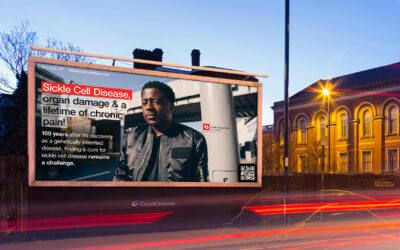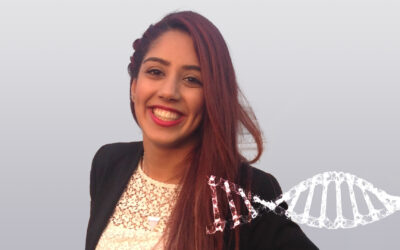This is What Sickle Cell Looks Like: The German Patient Perspective
Elvie Ingoli, President of the German Association for Sickle Cell Disease and Thalassaemia, speaks on the state of SCD care and what we need to resolve it.
For almost all her life, Elvie Ingoli was told never to hope for the impossible.
In Elvie’s case, the impossible meant being cured of her Sickle Cell Disease (SCD), surviving a bout of osteosarcoma resulting from a bone marrow transplant, and any hope of having children. However, thirty years on from her diagnoses, Elvie has defied all odds. Unbelievably, and perhaps miraculously, she is both cancer – and SCD – free.
As an SCD survivor, Elvie has used her platform to lead the German Sickle Cell Disease and Thalassaemia Association. She has advocated for thousands of patients all over the country to gain better access to care. Her work in Germany is driven by honouring the bravery of the country’s SCD community, their fight for their condition to be recognised as a serious health threat. Above all, she is inspired by her children, her ‘miracle babies’ who motivate her to make sure their generation will never have to encounter the challenges German SCD patients face today.
According to Elvie, their biggest challenge is the lack of awareness of the disease.
Despite improvements in SCD care globally, Elvie feels that Germany has lagged behind its European counterparts. Present research and the availability of treatments in Germany have helped to stem the SCD crisis. However, focus and investment in innovations – like the bone marrow transplant which cured her of SCD as a child – are still lacking in Germany.
Elvie believes that the slow uptake in innovations is because SCD is still very much an invisible condition in the country. She has seen new patients within her organisation struggle with an unfamiliar illness and the difficulties communicating their condition with their doctors:
“There has been a huge lack of education and awareness of SCD among clinicians and families. Many children have grown up not knowing they had SCD, only to suffer greatly as adults. SCD patients in Germany mostly come from immigrant backgrounds: African, Arab, and Turkish populations.
Because the condition is not common among Europeans, and immigrant families are not educated on the disease, generations of children have grown up without the knowledge or resources to support their health. And many have died because of it.”
To date, there is a limited German national database for SCD patients and just the nascent beginnings of a universal screening strategy. This has made gathering data needed for novel research gene editing therapies challenging. Elvie notes that this has also been a barrier to finding ‘donors’ for life-saving transfusions and research trials, which could help develop cures for SCD. Although Elvie is optimistic about the efficacy of gene therapies, she believes it is critical for German healthcare to solve a problem closer to home: the lack of SCD specialists. Elvie states:
“After 30 years of being cured of SCD, I can see improvements in Germany. However, there are still some gaps in our health system for SCD patients. Doctors are being educated more on the condition, and health centres are starting to open for us. But the focus has been on paediatric care. We still do not have enough specialised practitioners for adults, even though our adult patient population is growing”
Elvie adds that the lack of SCD awareness isn’t endemic to just the clinical community. It is also rife within immigrant and SCD communities. She warns that unless the stigma around SCD is redressed by patient communities themselves first, German SCD patients can only expect to suffer more. She says:
“Because of the stigma within our own German African and Congolese community, we never talk about sickle cell. As a result, I can see families suffering in silence with this disease. That’s why I decided to come out and talk about my story to motivate other patients to break the silence, to raise awareness, raise their voice so that they can receive better treatments, and they be taken more seriously.”
Elvie’s own experience, from childhood to adolescence, shows the need to speak up about conditions like sickle cell. Elvie was born with SCD in West Berlin to Congolese immigrant parents in the eighties. Although Germany was preparing for seismic social change at the time, Elvie and her newly settled community were exempt from the social and healthcare revolution that came with the fall of the Berlin Wall. As Germany focused on rebuilding its national identity around integration, healthcare for immigrants was left behind.
Germany of today has, of course, since moved passed this. However, as Elvie states, the legacy of neglected SCD patient care is still apparent among multiple communities in the country. Elvie observes:
“Germany has become more and more diverse over the years because of immigration and the refugee crisis. With the influx of diverse people have come patients with new conditions, like SCD. German SCD cases have increased with the arrival of Arabic refugees, Syrian refugees, and many more who desperately need care. However, clinicians cannot communicate with them, making access to treatment extremely difficult for patients.”
For the sake of Germany’s rich and incredibly diverse SCD population, Elvie believes that advocacy work with patients, clinicians and systems will increase awareness on the condition. She is hopeful that in 30 years, when her children are matured and grown, they will see a different reality for SCD in Germany and everywhere else in the world:
“In 30 years’ time, I hope to see a greater acceptance of the condition and higher concerns for our community. I want to see people talking about SCD more, which is already starting to happen thanks to social media, and work with policy makers. Education and research will also hopefully grow, giving future SCD patients better access to specialist care, resources and treatments.
But, 30 years is still a long way to go. And we have a lot of work to do. So I can only hope that we continue to partner with communities, doctors and organisations to improve the lives of those with SCD.”
To raise awareness of SCD, we are working with advocacy leaders like Elvie and other members of the SCD community to make improved SCD care a reality.
Learn more about raising awareness around Sickle Cell Disease by accessing Sanius Health’s campaign site: https://whatscdlookslike.com/




